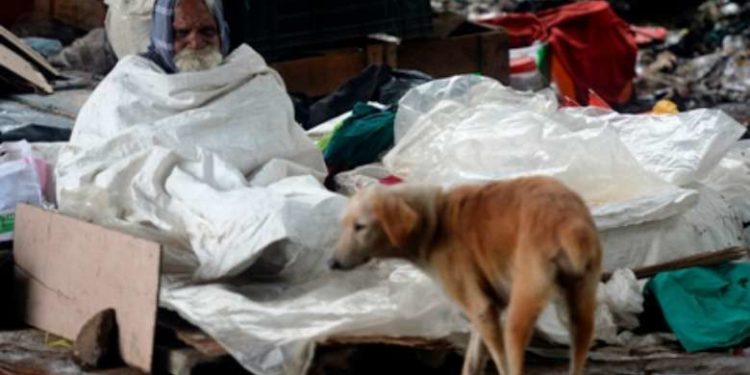The poor became poorer while the rich became richer in India during 2021, says a survey by Oxfam International.
Indian billionaires increased their wealth by 39 percent in 2021 and are getting richer at a much faster pace, but the poor saw their annual income drop by 53 percent and are still struggling to earn a minimum wage and access quality education and health care, the report revealed.
Titled “Inequality Kills: India Supplement 2022,” the report said that the richest 98 Indians own the same wealth as the bottom 555 million people.
Indian billionaires grew from 102 in 2020 to 142 in 2021 even though the country witnessed yet another year of pandemic. This was also the year when the share of the bottom 50 percent of the population in national wealth was a mere 6 percent.
The combined wealth of the richest 100 Indians on the Forbes list stands at more than half a trillion US dollars. There were only three women among the 100 richest Indians.
India had the third-highest number of billionaires in the world, just behind China and the United States. It now has more billionaires than France, Sweden and Switzerland combined; indeed, there was a 39 percent increase in the number of billionaires in India in 2021.
The massive gap between rich and poor will continue to increase to unimaginable proportions if the elected representatives of people in parliament do not take their job seriously
In 2020, India’s top 10 percent held close to 45 percent of the country’s national wealth.
The Oxfam report once again confirmed that while India is one of the fastest-growing economies in the world, it is also one of the most unequal countries with inequality continuing to rise sharply for the last three decades.
Since 2015, more and more of India’s wealth has gone to its richest one percent. Globally, too, wealth increased during 2021 to make the world’s billionaire elite richer when common people struggled against the pandemic for the second consecutive year.
“The massive gap between rich and poor will continue to increase to unimaginable proportions if the elected representatives of people in parliament do not take their job seriously,” said A.C. Michael, convener of the United Christian Forum.
Thank you. You are now signed up to Daily newsletter
This deliberate inequality was bound to continue, said Michael, a former member of Delhi Minorities Commission.
“Sadly, they [elected representatives] are more busy dividing people on the basis of religion for their political gains instead of addressing the more pressing issues that could better the lives of people,” he added.
Professor Himanshu Jain of Jawaharlal Nehru University said what is particularly worrying in India’s case is that “economic inequality is being added to a society that is already fractured along the lines of caste, religion, region and gender.”
This surge in the wealth of the country’s top 100 billionaires comes at a time when India’s unemployment rate was as high as 15 percent in urban areas and the healthcare system was on the brink of collapse.
Unfortunately, not only has the taxation policy been pro-rich but it has also deprived India’s states of important fiscal resources — both particularly damaging in the context of the Covid-19 crisis.
The government should also redirect revenue towards health, education and social security, treating them as universal rights and as a means of reducing inequality
The pandemic revealed how dependent Indian states are on the federal government for technical expertise and financial support despite a federal structure supported by India’s constitution.
In spite of health being a state subject, the state continued to retain more resources in non-divisible pools rather than devolving them to manage the pandemic.
The Oxfam report recommended that the government revisit its primary sources of revenue generation, adopting more progressive methods of taxation and assessing its structural issues that permit such wealth accumulation by the rich.
Additionally, the government should also redirect revenue towards health, education and social security, treating them as universal rights and as a means of reducing inequality, thereby avoiding the privatization model for these sectors.
Oxfam also called on the government to recognize the unequal lives that Indian citizens live by measuring them and legislating to protect their interests.
Support UCA News…
….As we enter the first months of 2022, we are asking readers like you to help us keep UCA News free.
For the last 40 years, UCA News has remained the most trusted and independent Catholic news and information service from Asia. Every week, we publish nearly 100 news reports, feature stories, commentaries, podcasts and video broadcasts that are exclusive and in-depth, and developed from a view of the world and the Church through informed Catholic eyes.
Our journalistic standards are as high as any in the quality press; our focus is particularly on a fast-growing part of the world – Asia – where, in some countries the Church is growing faster than pastoral resources can respond to – South Korea, Vietnam and India to name just three.
And UCA News has the advantage of having in its ranks local reporters who cover 23 countries in south, southeast, and east Asia. We report the stories of local people and their experiences in a way that Western news outlets simply don’t have the resources to reach. And we report on the emerging life of new Churches in old lands where being a Catholic can at times be very dangerous.
With dwindling support from funding partners in Europe and the USA, we need to call on the support of those who benefit from our work.
Click here to find out the ways you can support UCA News. You can make a difference for as little as US$5…
Credit: Source link




